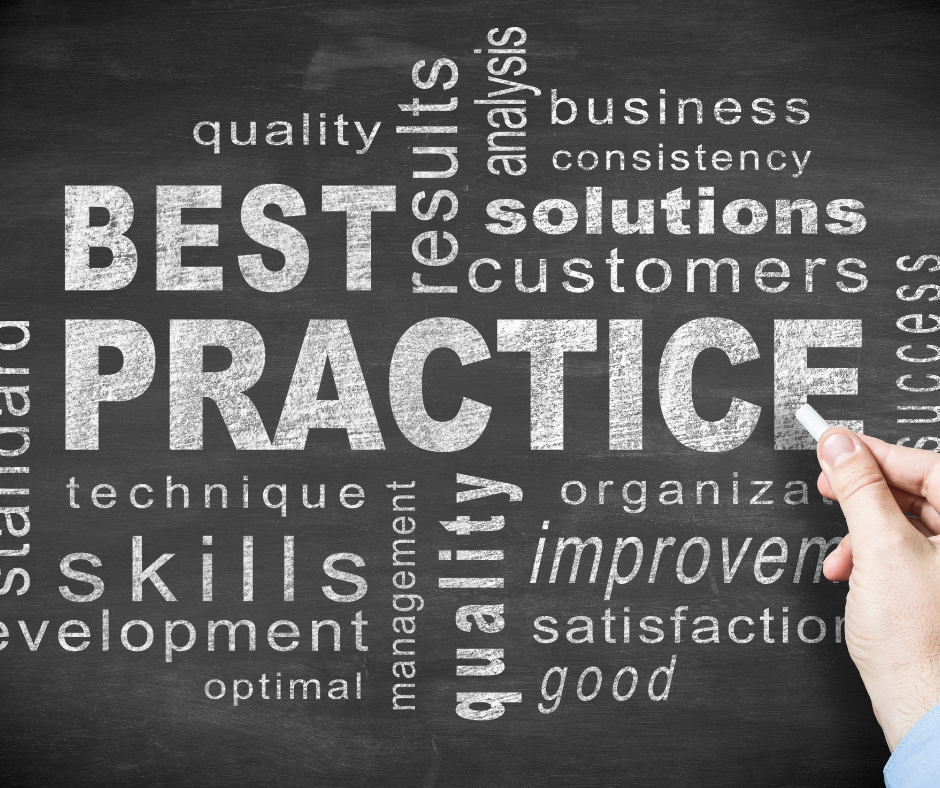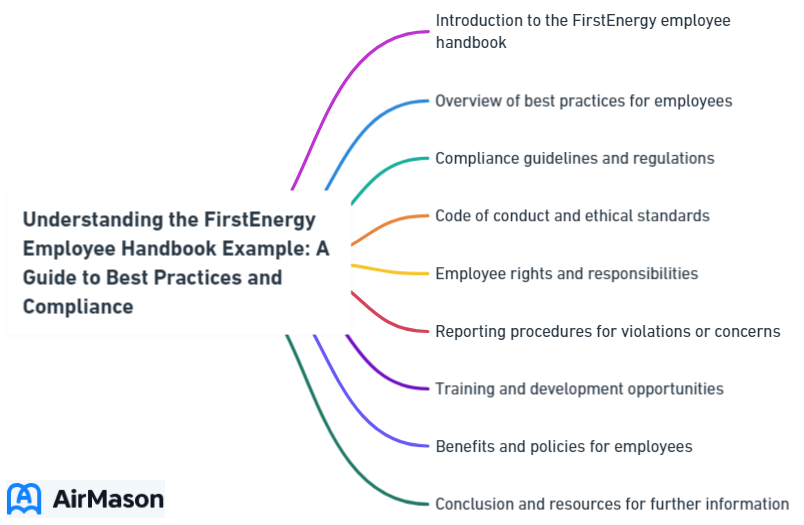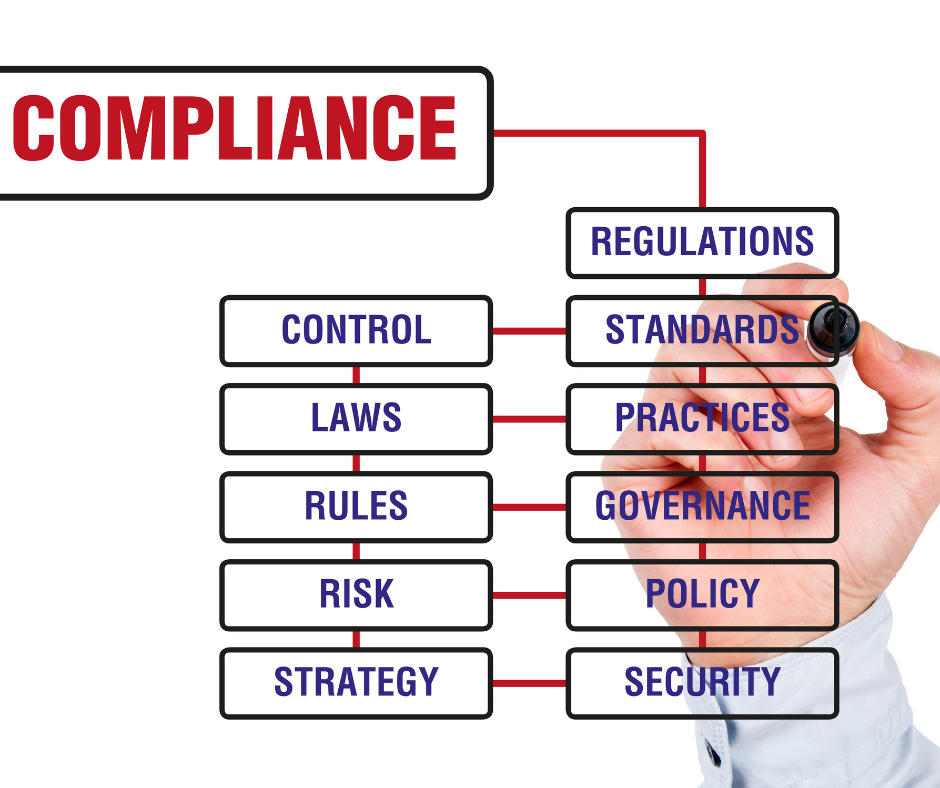
Curious about what shapes the culture and policies at FirstEnergy? This article breaks down the components of a typical FirstEnergy employee handbook example, covering the pivotal Code of Conduct, compliance standards, and reporting structure. Get ready to grasp the critical elements that guide the behavior and responsibilities of FirstEnergy employees.
Key Takeaways
- FirstEnergy’s Code of Conduct is central to its operations, guiding employees towards ethical decisions and establishing accountability for actions, which is crucial for maintaining the company’s reputation for trust and integrity.
- The company encourages reporting of potential violations through the Employee Concerns Helpline and other established channels, with a strict non-retaliation policy to maintain a culture of openness and trust.
- FirstEnergy’s Compliance Officer plays an essential role in ensuring regulatory compliance, staff training on ethical conduct, and ongoing monitoring and improvement of compliance practices to address and mitigate potential violations.
Fortune 100 Company Employee Handbook
Welcome to our esteemed Fortune 100 company, where excellence and commitment drive our success. The “Fortune 100 Company Employee Handbook” serves as your comprehensive guide to our organizational values, policies, and expectations. As an integral part of our workforce, it is crucial for every employee to familiarize themselves with the contents of this handbook. Here, you will find valuable information on workplace conduct, benefits, and the principles that define our company culture. Your understanding and adherence to the guidelines outlined in the Fortune 100 Company Employee Handbook are vital in maintaining a harmonious and productive work environment. We encourage you to explore this resource thoroughly, ensuring a mutually beneficial and rewarding journey as a member of our dynamic team.
Embracing the FirstEnergy Code of Conduct
FirstEnergy’s operations revolve around its Code of Conduct, which serves as a guiding light, leading employees towards ethical decision-making and helping them comprehend disciplinary actions. It’s not just a set of rules but a roadmap to:
- Integrity
- Safety
- Fair treatment
- A culture of belonging
The Code of Conduct highlights the significance of honesty, humility, and accountability, serving as a moral compass for every member of the FirstEnergy family.
Every individual in the organization, from the boardroom to the field, is obligated to abide by the Code of Conduct. This shared commitment to ethical behavior reinforces the company’s reputation for reliability, trustworthiness, and excellence in the eyes of stakeholders, including customers, shareholders, and communities.
The Power of Integrity
Integrity, the cornerstone of FirstEnergy’s operations, is more than a concept; it’s a way of life for all employees. This commitment to ethical conduct and decision-making aligns personal behavior with FirstEnergy’s values, fostering trust with:
- customers
- shareholders
- employees
- communities
Every individual in the organization, from the chief ethics officer to new hires, is held accountable for their actions, regardless of their role, seniority, or tenure. This emphasis on integrity is evident in the daily behavior of employees, ensuring adherence to laws and company policies, and demonstrating honesty, trustworthiness, dependability, confidentiality, and respect towards others.
Accountability and Disciplinary Action
Accountability is a natural extension of integrity. At FirstEnergy, every individual is held accountable for their actions, with disciplinary measures in place for violations of the Code of Conduct. The disciplinary process includes the following steps:
- Verbal warning
- Written warning
- Suspension
- Termination
This process ensures that address concerns are addressed in a clear and actionable manner.
Actions such as accepting bribes or kickbacks, which violates laws, are strictly prohibited and can lead to termination. The enforcement of disciplinary actions is fair and impartial, with The Power of Integrity serving as the guiding force. Breaching The Power of Integrity can lead to disciplinary action, potentially resulting in termination.

Navigating Employee Concerns and Reporting
FirstEnergy cultivates a culture where employees are motivated to express their concerns without hesitation. The Employee Concerns Helpline, a dedicated channel for reporting potential violations, empowers employees to bring issues to the company’s attention. This proactive approach plays a critical role in maintaining a culture of integrity and compliance.
Beyond the helpline, employees can directly communicate their concerns to Human Resources or anonymously report through the EthicsPoint website. FirstEnergy strictly prohibits retaliation against individuals who raise an ethical concern or report a possible violation, reinforcing a culture of openness and ethical behavior.
Employee Concerns Helpline
The Employee Concerns Helpline provides a platform where employees can report anonymously and confidentially any concerns or ethical violations. Whether it’s a minor concern or a serious violation, the Helpline ensures that concerns are heard and addressed appropriately. Employees can report concerns related to corruption or bribery through this dedicated channel.
The process to report concerns through the Helpline is straightforward. Employees can reach out by calling 1-800-683-3625 or accessing EthicsPoint online, with all calls answered by an independent third-party representative.
Addressing Concerns through Human Resources and Supervisors
Human Resources and supervisors serve distinct yet complementary roles in addressing employee concerns at FirstEnergy. HR acts as a mediator, ensuring that grievances are heard, investigated, and resolved in a fair and impartial manner. Supervisors guide employees to engage with senior managers, contact HR, or utilize the Employee Concerns Helpline when necessary.
FirstEnergy encourages employees to report their concerns through established channels without fear of retaliation. By aligning its actions with The Power of Integrity and maintaining clear communication channels, the company reinforces its dedication to an open and transparent process.
Qurate Retail Employee Handbook Example
In this section, we delve into a comprehensive Qurate Retail employee handbook example, providing insight into the company’s policies, guidelines, and expectations. The Qurate Retail employee handbook exemplifies the organization’s commitment to fostering a positive work environment. From onboarding procedures to code of conduct, the handbook serves as a valuable resource for employees, ensuring clarity on various aspects of their professional journey with Qurate Retail. This illustrative guide is designed to empower employees with the necessary information to navigate their roles successfully, emphasizing the company’s dedication to creating a supportive and inclusive workplace.
Compliance Officer’s Role and Responsibilities

The Compliance Officer holds a key role in preserving and enhancing the company’s compliance program, including places compliance. Their responsibilities include:
- Ensuring organizational compliance with government regulations
- Revising policies and updating procedures as needed
- Overseeing policies and providing training and education to employees on compliance matters
- Communicating compliance requirements and ensuring employees’ understanding of the company’s policies and bylaws.
A Compliance Officer at FirstEnergy is expected to possess:
- A robust comprehension of ethics and compliance principles
- Exceptional leadership and communication abilities
- The capacity to assess and address compliance-related matters.
Continuous Improvement and Monitoring
The role of a Compliance Officer at FirstEnergy heavily emphasizes:
- Continuous improvement
- Monitoring
- Regularly reviewing and assessing compliance procedures
- Identifying areas for improvement
- Ensuring continuous monitoring of activities within the organization
The essential components of continuous monitoring in compliance management encompass:
- Automated data collection
- Analysis
- Reporting
- Response
This continuous improvement process facilitates efficient risk management and verifies the proper functioning of controls, allowing the organization to proactively manage compliance.
Investigating Suspected Violations
Investigating actual or suspected violation is a key responsibility of the Compliance Officer. When a suspected violation comes to light, they:
- Conduct internal investigations
- Interview involved individuals
- Review pertinent documents
- Oversee activities related to the reporting and investigation of suspected compliance violations.
FirstEnergy maintains a policy that enables firstenergy employees to express concerns, report violations, and participate in investigations while preserving confidentiality. This policy safeguards the anonymity of employees and fosters a culture where they can voice potential issues without fear of reprisal.
Employee Training and Development

FirstEnergy provides employees with extensive training and development opportunities to deepen their comprehension of ethics and compliance. The Office of Ethics and Compliance leads training programs, which cover:
- Processes
- Policies
- Controls
- The Code of Conduct
- Gifts and entertainment requirements
- Conflicts of interest
- Reporting concerns
These programs provide comprehensive business education on a range of important topics in the workplace.
By providing a robust training platform, FirstEnergy ensures a uniform comprehension and execution of expectations pertaining to ethics and compliance. The effectiveness of this training is evaluated through feedback surveys, assessments, and performance evaluations, providing a constant feedback loop for continuous improvement.
Mandatory Ethics and Compliance Courses
FirstEnergy’s training program crucially includes mandatory ethics and compliance courses. These courses ensure a uniform understanding of the company’s expectations by providing training on processes, policies, and controls detailed in the Code of Conduct and other specific standards.
FirstEnergy’s compulsory ethics and compliance training encompasses subjects such as:
- Supporting ethics and compliance initiatives
- Adherence to the Code of Conduct
- Gifts and entertainment policies
- The Supplier Code of Conduct
- Function-specific Standards of Conduct training
The delivery of these courses, overseen by the Office of Ethics and Compliance, is flexible and may encompass online, in-person, or hybrid delivery methods.
Additional Resources and Support
In addition to mandatory courses, FirstEnergy extends further resources and support to employees, which include dedicated workshops, seminars, and online resources. These resources supplement the mandatory training, providing a more comprehensive understanding of ethics and compliance.
These resources are easily accessible to employees through the company’s website, which provides a variety of employee training and an extensive library of educational resources. Additionally, the Life Resources Program offers 24/7 confidential support, information, and referral services, further enhancing the support available to employees.
Creating a Culture of Compliance

At FirstEnergy, the creation of a culture of compliance is a collective endeavor, nurtured by leadership’s dedication to ethical behavior and employees’ active engagement in embracing the company’s values. This culture of compliance is not just about following rules; it’s about embedding ethical decision-making in the DNA of the organization.
Leadership behavior has a significant impact on establishing a compliance-oriented culture. Leaders at FirstEnergy not only embody the desired culture but also provide guidance and correction, shaping the organization’s culture of compliance.
Furthermore, employee engagement and ownership play a crucial role in fostering a culture of integrity and compliance.
Leadership’s Role in Modeling Ethical Behavior
Leaders hold an instrumental role in establishing the company’s commitment to compliance. By consistently adhering to The Power of Integrity and upholding the core values of:
- Integrity
- Safety
- Diversity equity and inclusion
- Performance
They model the desired behavior for all employees.
The impact of leadership behavior on the organization’s culture of compliance is profound. Leaders who embody the desired culture exert normative and social influence, shaping the organization’s culture of compliance and strengthening organizational values.
Analog Devices Employee Handbook Example
Analog Devices takes pride in its commitment to fostering a positive work environment, as exemplified in the Analog Devices employee handbook. The Analog Devices employee handbook example reflects the company’s dedication to transparency, fairness, and employee well-being. This comprehensive document outlines the company’s values, policies, and expectations, providing a valuable resource for employees to navigate their professional journey within the organization. By adhering to the guidelines outlined in this handbook, employees contribute to the overall success of the company while enjoying a supportive and inclusive workplace culture.
Employee Engagement and Ownership
FirstEnergy’s culture of compliance is primarily driven by its employees. They are encouraged to take ownership of their actions and actively engage in promoting a culture of integrity and compliance. When employees perceive themselves as valued and trusted, they are more inclined to assume responsibility for their work and contribute to a compliant culture.
Employee ownership instills a sense of accountability among employees towards organizational policies and guidelines. This fosters ethical conduct and trust among employee owners, consequently leading to a culture of integrity. Furthermore, a culture of integrity enhances the organization’s capacity to effectively manage compliance.
Summary
In the journey through FirstEnergy’s Employee Handbook, we’ve seen how the company’s commitment to integrity, accountability, and compliance lies at the heart of its operations. From the top leadership to every employee, the culture of compliance permeates every level of the organization. By fostering open communication and trust, providing comprehensive training, and ensuring fair and impartial enforcement of rules, FirstEnergy sets a high standard of ethical excellence.
Frequently Asked Questions
What is FirstEnergy’s Code of Conduct?
FirstEnergy’s Code of Conduct prioritizes integrity and accountability, guiding employees to make ethical decisions and understand disciplinary actions.
How does FirstEnergy address employee concerns and reports?
FirstEnergy encourages employees to voice their concerns and provides a helpline for reporting, promoting an open and supportive environment.
What is the role of a Compliance Officer at FirstEnergy?
The Compliance Officer at FirstEnergy plays a crucial role in maintaining and improving the company’s compliance program, including monitoring and investigating potential violations.
What kind of training does FirstEnergy provide to its employees?
FirstEnergy provides comprehensive training and development opportunities focused on ethics and compliance for its employees.
How does FirstEnergy create a culture of compliance?
FirstEnergy creates a culture of compliance by fostering leadership’s commitment to ethical behavior and engaging employees in upholding the company’s values.
Important Disclaimer:
The article presented here does not serve as a representation of the company’s actual employee handbook mentioned in this article.
Our discussions and insights regarding employee handbook are based on assumptions about what may be considered significant in the companies’ policies. These assumptions are drawn from available information and industry knowledge. Readers are advised that the content provided is for informational purposes only and should not be construed as an exact reflection of any company’s official policies or procedures. For precise and accurate details regarding a company’s employee handbook, individuals should refer directly to the company’s official documentation or consult with appropriate representatives.
Please be aware that the content on this page has been generated by using artificial intelligence language models and may contain errors, inconsistencies, or outdated information. It is provided as-is without any warranties or guarantees of accuracy. We strongly recommend using this content as a starting point for further research. We disclaim any liability for damages or losses resulting from the use or reliance on this content.